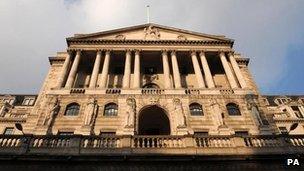Scottish independence: Scots 'should consider own currency', economist says
- Published

Scotland should be ready to adopt an independent currency if the country votes in favour of leaving the UK, a leading economist will warn.
In a lecture later, Prof John Kay will say the Scottish government "would be right" to try to form a monetary union with the rest of the UK.
But it could be "difficult" to negotiate an agreement that would give Scotland the fiscal freedom it sought.
Prof Kay is to raise the issue in a talk at Glasgow University.
The Scottish government favours keeping the pound if the country were to become independent after next year's referendum, with SNP ministers proposing the country would be part of a "sterling zone" with the rest of the UK.
However, the former member of the Scottish government's council of economic advisers will state: "The currency issue is crucial - Scotland would be right to seek agreement on monetary union with the remaining United Kingdom, but it would be difficult to negotiate an agreement that would be consistent with the fiscal freedom sought through independence.
"Scotland should be ready to adopt an independent currency.
'Strongly favourable'
"Market expectations would begin to force events from the day a Yes vote was obtained."
Prof Kay, a visiting professor at the London School of Economics and a fellow of St John's College, Oxford will say that, in the event of independence, oil revenues would be "split on a formula strongly favourable to Scotland".
Yet he will add that, with higher levels of public spending per person in Scotland, the overall position will "at least initially, be little different from the present".
The economics expert will also address the issue of an independent Scotland's membership of the European Union (EU), saying there would "limited negotiation" on this that would "mainly concern the variety of opt outs enjoyed by the UK".
On the issue of Europe, he will claim that the EU "would probably settle for some vague and indefinitely postponed aspiration" that Scotland would adopt the euro.
Finance Secretary John Swinney welcomed the remarks, saying: "John Kay joins a growing range of experts who agree that Scotland's negotiations to continue in the EU as an independent country will be straightforward."
"We also welcome Professor Kay's endorsement of the Scottish government's policy for an independent Scotland to keep the pound - and there is no provision to make any member of the EU join the euro."
Financial problems
Mr Swinney said the claim that the vast bulk of North Sea oil will accrue to an independent Scotland "further underlines the economic case for independence".
However, the Conservatives and Liberal Democrats both suggested Prof Kay's remarks backed their own views that independence would result in financial problems.
Liberal Democrat leader Willie Rennie MSP said: "Alex Salmond's former adviser and favoured economic expert is now warning that an independent Scotland stands to lose out in negotiations for re-entry to the EU and has cast further uncertainty over the Nationalists' plans for an independent Scotland to keep the pound.
"This growing opinion from experts around the economic issues of independence and the failure of Alex Salmond to heed let alone address these will make people more anxious about his independence plans, particularly in these tough economic times."
Conservative deputy leader Jackson Carlaw added: "The Scottish government seems to think it will be waved in by the Bank of England without any questions and given a prime seat on the Monetary Policy Committee.
"That privilege isn't afforded to any other separate state, so why would Salmond's separate Scotland be any different?"
- Published19 February 2013
- Published19 February 2013